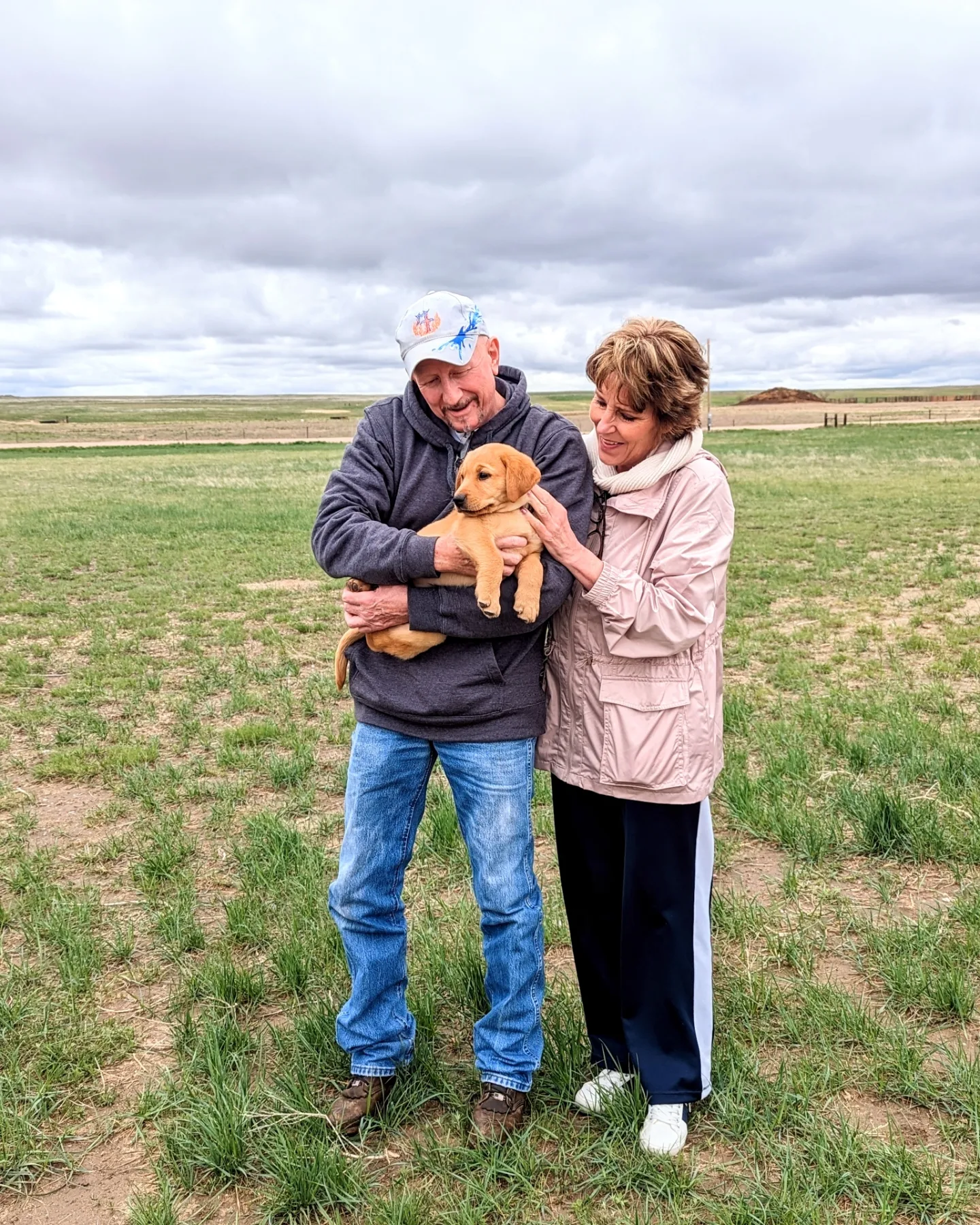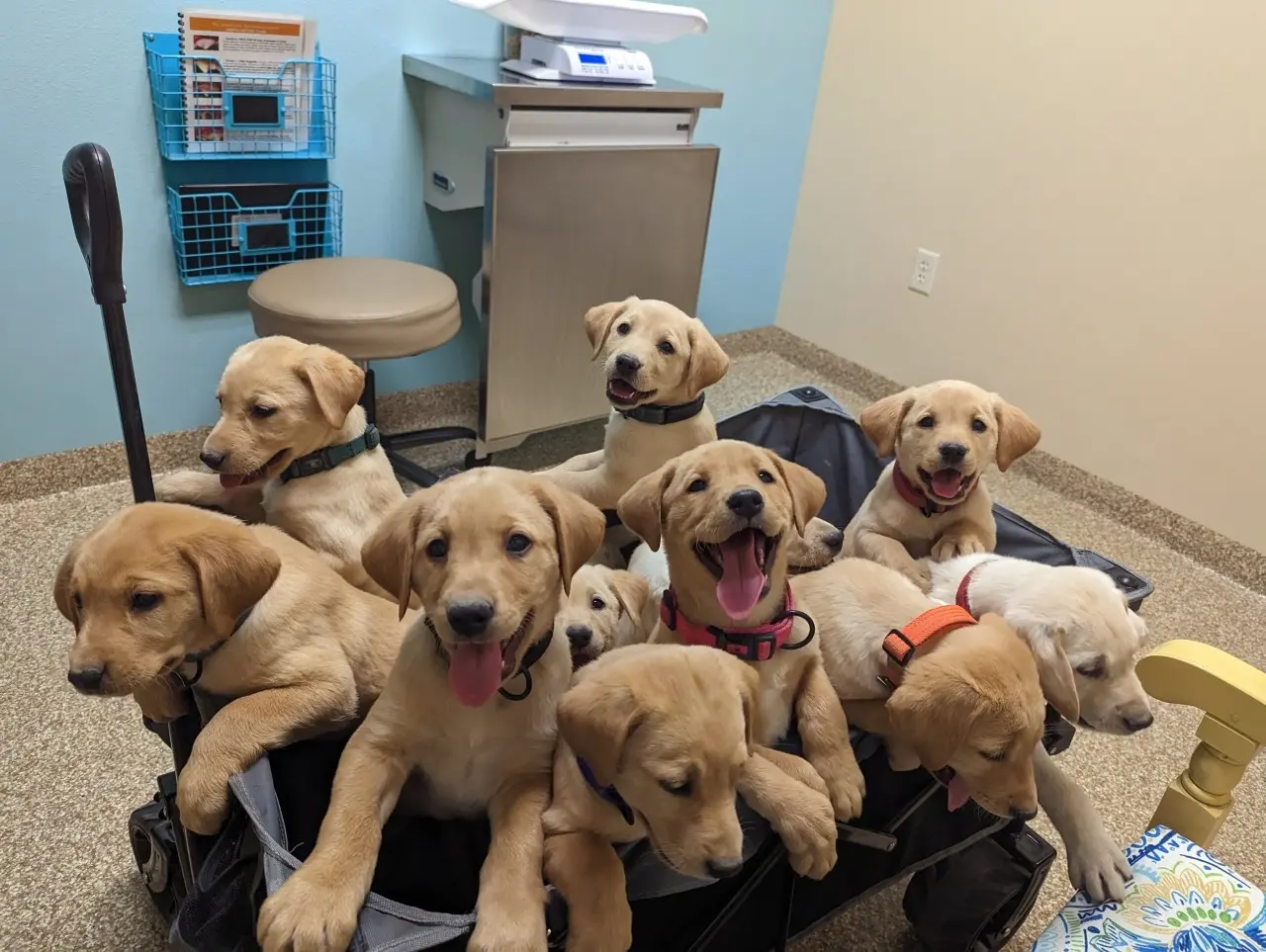The Importance of Early Socialization for Hunting Dogs
- LC Hunting Labs

- Sep 8, 2024
- 4 min read
Updated: Nov 30, 2024
Early socialization is crucial for all dogs, but it's especially important for hunting breeds like Labradors. These highly intelligent and energetic dogs need to be confident, adaptable, and resilient to handle the dynamic environments they will encounter in the field. The foundation for a successful hunting dog begins with early and consistent socialization, helping them navigate various situations with ease, from encountering different animals to adapting to new terrains.
In this blog, we’ll explore why early socialization is key for young Labradors and how it prepares them for a successful hunting career.
What is Socialization?
Socialization is the process of exposing a young dog to a variety of environments, people, animals, and experiences in a positive way. This exposure helps your dog develop confidence, reduce fear or anxiety, and adapt to new situations. For hunting dogs, socialization goes beyond basic interactions—it's about preparing them for the unpredictability of the field, so they can remain focused and calm under pressure.
Why Socialization Matters for Hunting Dogs
1. Building Confidence
A confident hunting dog is essential when navigating the complexities of the field. Early socialization helps Labradors feel comfortable in unfamiliar settings, such as dense forests, marshes, or wide-open fields. It reduces fear and hesitation when encountering new sights, sounds, and smells, which is vital when they need to react quickly and efficiently during hunts.
By introducing your Labrador to a wide range of environments as a puppy, you help them develop the mental resilience they’ll need to tackle the physical demands of hunting later on. Whether it's the sound of a gunshot or the splash of water as they retrieve a bird, your dog will be less likely to get startled or anxious if they've had these experiences early on.
2. Exposure to Other Animals
In hunting, Labradors will frequently encounter wildlife, from birds and waterfowl to larger animals. Early socialization exposes your dog to different species, ensuring they react appropriately rather than fearfully or aggressively. The goal is to familiarize them with these animals, so they understand the difference between prey and non-prey and respond to commands without distraction.
Controlled Play with Other Dogs: Introducing your Labrador to other dogs early on helps them develop proper social skills. Playdates or visits to dog parks are great ways to encourage healthy dog-to-dog interaction, which will benefit them when hunting with other dogs in the field.
Supervised Encounters with Livestock or Wildlife: If possible, expose your dog to the types of animals they might encounter while hunting. Controlled exposure helps them remain calm and focused when they encounter live game, instead of becoming overly excited or fearful.
3. Adaptability to Different Environments
Hunting dogs must be adaptable to a variety of terrains and weather conditions. Whether it's running through a dense forest, swimming in lakes, or crossing rocky fields, Labradors need to feel comfortable and confident. Socializing them to different environments early helps ensure they can handle the physical and sensory challenges of hunting.
Urban and Rural Exploration: While it might seem counterintuitive, taking your Labrador into busy urban environments can help desensitize them to noise, crowds, and other distractions. This builds their focus for fieldwork, where staying calm amidst distractions is crucial.
Water Exposure: Labradors are natural swimmers, but gradual exposure to different bodies of water—from shallow streams to larger lakes—can help build their confidence in retrieving from various aquatic environments.
4. Positive Human Interactions
As hunting dogs, Labradors often work alongside handlers, hunters, and other individuals. Socializing your puppy with a wide variety of people ensures they grow up well-mannered, approachable, and responsive to commands from their handler.
Meeting Different People: Expose your puppy to people of all ages, sizes, and appearances. This helps them understand that people are not to be feared and can build a positive relationship with humans.
Handling Exercises: Get your puppy used to being handled by others. Let them be touched on their paws, ears, and mouth—areas that might need attention in the field. This also helps with vet visits and grooming, making them less stressful for your dog.
5. Preparing for Hunting Situations
Socialization allows you to simulate real hunting scenarios, preparing your Labrador for what’s to come. This can include training with decoys, exposure to gunfire, and mock retrieval exercises in varied terrains.
Gunfire Desensitization: Slowly introduce your Labrador to the sound of gunfire in a controlled setting. Start with distant or soft sounds and gradually increase the volume. This prevents the dog from becoming gun-shy, which can be a significant problem for hunting dogs.
Simulated Hunts: You can gradually expose your puppy to controlled hunting scenarios, such as retrieving scented dummies or feathers. These experiences allow them to build the skills they’ll need in the field, such as staying focused and following commands.
Best Practices for Early Socialization
To ensure your Labrador gets the most out of their early socialization, keep these tips in mind:
Start Early, But Go Slow: Puppies are naturally curious, so start socializing them as early as 8 weeks. However, ensure each new experience is positive and not overwhelming. Gradually increase exposure to new situations over time.
Use Positive Reinforcement: Reward your puppy with treats, praise, and affection during and after new experiences. This helps them associate socialization with positive outcomes.
Keep Sessions Short and Fun: Young Labradors have limited attention spans, so keep socialization sessions short and engaging. The goal is to build positive experiences without overwhelming them.
Consistency is Key: Socialization isn’t a one-time event—it’s an ongoing process. Regularly expose your dog to new environments, people, and animals to ensure they continue building confidence as they grow.
Early socialization is essential in raising a confident, resilient, and well-rounded hunting dog. By exposing your young Labrador to different environments, people, and animals, you help them develop the necessary skills to thrive in the field. Proper socialization ensures that your dog will not only excel during hunts but also be a calm, confident, and well-mannered companion in everyday life.
Whether you’re preparing your Labrador for hunting season or simply want them to be a well-adjusted member of the family, early socialization is a critical part of their development. With patience and positive reinforcement, you’ll have a hunting dog that’s ready to face any challenge with confidence.
Good luck, and enjoy watching your Labrador grow into the loyal, fearless hunting partner you’ve always wanted!








































Comments